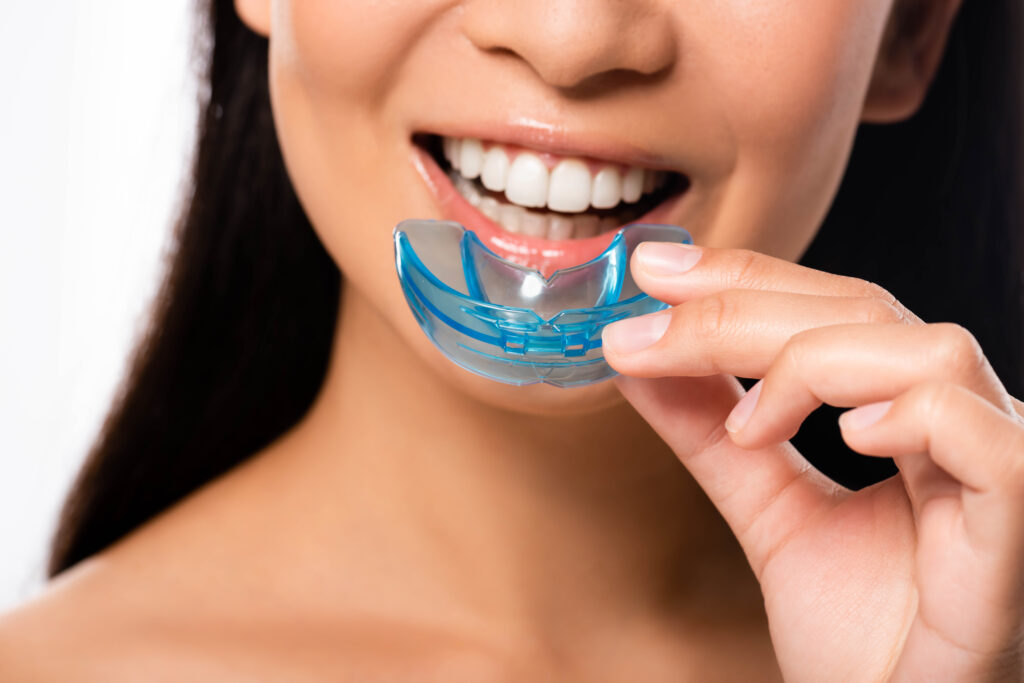Tooth grinding, also known as bruxism, affects about 10% of adults and 15% of children in the United States. This common sleep disorder, if left untreated, can lead to a host of health issues; however, prevention and treatment options have proven to be effective. If you struggle with grinding your teeth, whether during the day or while you sleep, keep reading to get answers to six important questions you may have.
#1. What is Bruxism?
Most people grind their teeth sometimes, which isn’t usually a problem. Bruxism refers to frequent teeth grinding, which is a bigger issue that can cause many oral health problems. There are two types, and treatment options and causes vary based on the type.
Awake Bruxism
If you suffer from awake bruxism, you often find yourself clenching your jaw or grinding your teeth throughout the day, especially if you’re feeling anxious or stressed or are concentrating particularly hard on something.
Because you are able to notice when you’re clenching your jaw or grinding your teeth and can make a conscious effort to stop, awake bruxism does not usually require treatment; however, being mindful of things in your life that cause stress or anxiety can help reduce how frequently teeth grinding occurs.
Sleep Bruxism
Conversely, sleep bruxism occurs unconsciously at night and may not be linked to one’s emotional state. This type is more serious and harder to treat. Because you are asleep, you don’t notice your teeth grinding, so you are unable to consciously stop.
#2. How Does Bruxism Affect Oral Health?
Frequent teeth grinding can negatively affect your oral health. Your jaw muscles are incredibly strong and can exert up to 250 pounds of force, which puts strain on your teeth and can cause many different problems, including:
- A cracked or loose teeth
- Headaches
- Aesthetic changes in the face and profile
- Tooth loss
- Jaw pain, locked jaw, and TMJ disorders
- Strained neck and jaw muscles
- Pain when eating
- Worn-down tooth enamel
- Disrupted sleep
- Earaches
#3. What Are the Causes of Bruxism?
Bruxism can’t be linked to one specific cause. Instead, it often occurs due to a combination of many different factors. People who are more prone to anxiety and stress or have a highly-driven personality are more likely to develop it. Your risk is also increased if you smoke cigarettes, consume caffeine, use medication to treat anxiety, or have a family history of the condition.
#4. How Does It Affect Children?
Although bruxism is more common in children than adults, they are less likely to experience long-term negative effects because their jaws and teeth change so rapidly. Many children stop grinding their teeth by the time their adult teeth are finished developing.
Allergies, misaligned teeth, mouth irritation, obstructive sleep apnea, or heredity can cause bruxism in children. If you notice your child grinding their teeth or clenching their jaw at night, bring it up to their dentist. They can identify the root cause and determine if treatment is needed.
#5. How Is Bruxism Treated?
If you think you may have teeth grinding issues, talk to your dentist. They can perform an examination of your jaws and teeth and identify any anomalies that could be signs you’ve been grinding your teeth. They may recommend you wear a mouth guard to wear at night to protect your teeth or prescribe a muscle relaxer to take at bedtime.
Additionally, your dentist can also treat the effects of bruxism. Dental crowns, veneers, or implants can fix broken, cracked, or worn-down teeth.
#6. Can It Be Prevented?
If you are susceptible to stress and anxiety, you can decrease your chances of developing bruxism by taking care of your mental health. This can be achieved through cognitive behavioral therapy, physical therapy, meditation, and exercise.
Whenever you notice yourself clenching your jaw during the day, do your best to stop. In addition, you should also avoid frequently chewing non-food items like gum, pencils, and pens, in addition to staying away from alcohol, excessive caffeine, and smoking.
Catching bruxism early is key to preventing serious issues. Your dentist knows the signs and can determine whether it is having adverse effects on your oral health, so regular dental cleanings and exams are essential.
High-Quality Care at Jenson Dental
At Jenson Dental, our highly-skilled, accredited team of dental professionals is committed to providing exceptional dental care to each and every patient. We offer general and cosmetic procedures to take care of teeth, repair damage, and restore our patients’ smiles. Schedule an appointment today!



